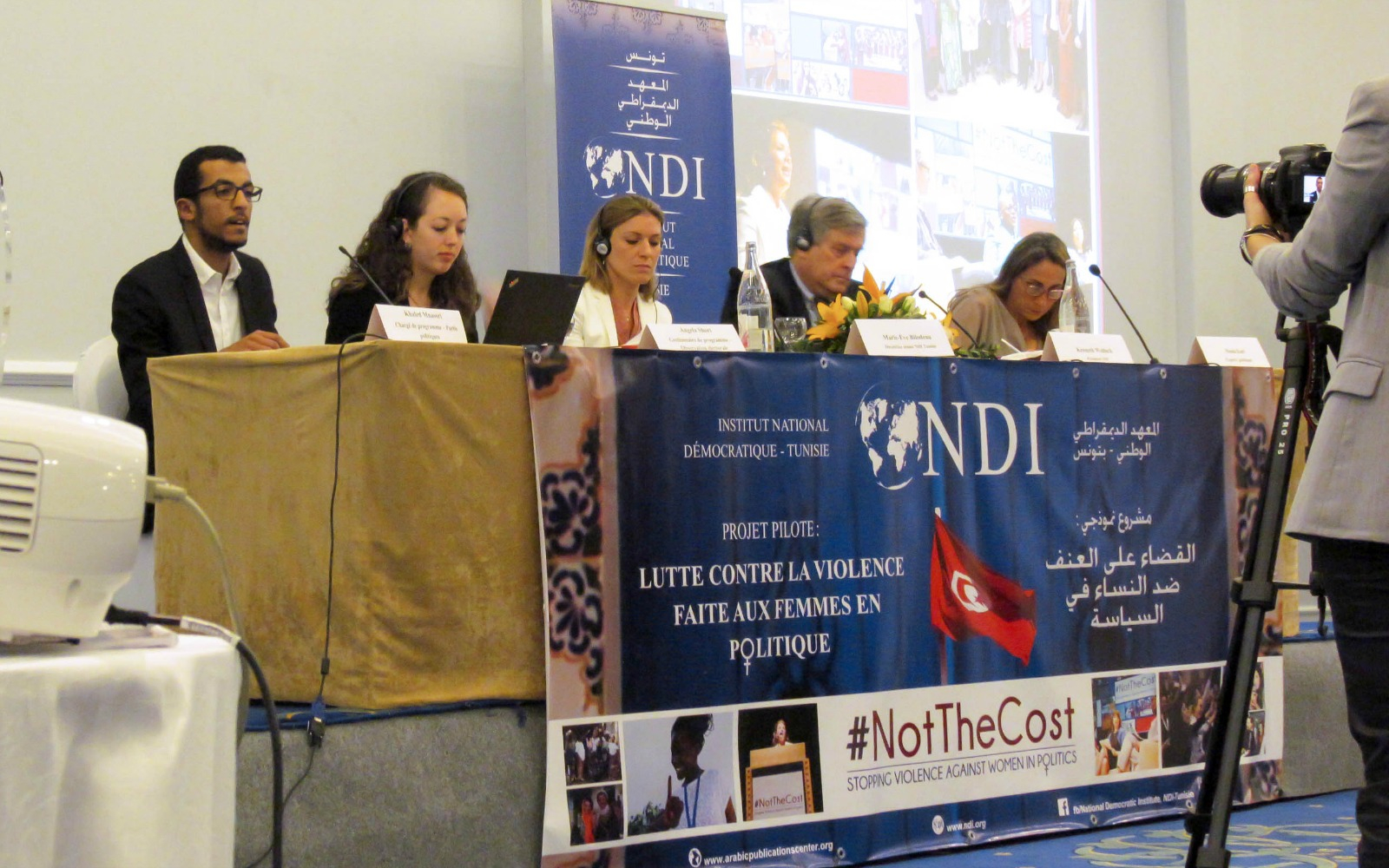
April, 2017 – NDI launched a pilot initiative in Tunisia as part of the Institute’s global #NotTheCost campaign issuing a call to action to combat violence against women in politics.
SHARE
On July 26, 2017, Tunisia’s Assembly of People’s Representatives (ARP) unanimously passed groundbreaking legislation on the Elimination of Violence against Women. After years of debate and deliberation, the new law strengthens penalties against those who commit violence against women, both in the privacy of their home or in public. Among other things, the legislation offers a comprehensive definition of different types of violence covered by the law: “Any physical, moral, sexual or economic aggression against women based on discrimination between genders and resulting in damage or physical, sexual, psychological or economic suffering to the woman, including threats of such aggression, pressure or deprivation of rights and freedoms.”
Tunisian lawmakers developed the new law with ongoing technical assistance provided by local CSOs as well as the National Democratic Institute (NDI) with support from the U.S. Department of State’s Middle East Partnership Initiative (MEPI). The law addresses gaps in existing national legislation – particularly the criminal code. While outlining forceful penalties for those convicted, the law is also progressive in establishing proactive steps and compelling specific mitigations, such as public education initiatives, a hotline for at-risk women and a special police unit to investigate violent crimes against women. The passage of the law sets an important benchmark for continuing to promote and secure the rights of women in Tunisia and ensure realities on the ground match the aspirations of the country’s forward-leaning constitution.
As important as the content of the law was the deliberative nature by which it was developed and passed. The entire process included multi-party dialogues, open debate, input and inclusion of civil society and constituent feedback. Such an approach, supported by MEPI since 2015, underpins NDI’s on-going efforts to enhance the legislative and political process in Tunisia so that it is responsive to public priorities, inclusive of all citizen voices and demonstrates how a participatory approach to governance can ensure greater peace and stability. The process was supported by the Institute’s continued work with 92 percent of the women holding seats in the parliament as well as findings and perspectives on women’s issues gathered through qualitative research that NDI has conducted since 2011 with more than 2,500 participants across all of Tunisia’s governorates.
As public momentum for the introduction of the legislation built, NDI collaborated with the Ministry of Women’s Affairs, legislators and civil society groups to host a debate in March 2016 on violence against women as part of activities organized to celebrate International Women’s Day. The event gathered a cross-section of stakeholders to ensure all would have a role in the development, passage and implementation of the new legislation, including the Minister of Women’s Affairs, members of parliament (MPs) from across the political spectrum, judges, academics, civil society representatives, public servants and journalists. In addition to sharing their own perspectives and concerns, the participants gained insights and guidance on how they could each most effectively take part in the drafting of the law as the process unfolded. In addition, discussions also provided the opportunity for exchanges on comparative experiences from Europe, North Africa and North America, including the United States.
As the bill was being developed, the Institute provided more than 20 consultations and trainings for MPs in multi-partisan and specific parliamentary group settings, including for members of the key committees charged with studying and shaping the legislation. These sessions helped the MPs analyze the 43 articles of the law to consider what might be strengthened, compare elements to other examples and discuss ways of gathering and incorporating constituent feedback. To this end, NDI assisted MPs in organizing and leading town hall meetings and virtual discussions with constituents to discuss the draft legislation, as well as an online outreach campaign to gather personal testimonials and opinions from citizens. Armed with this input, the participating MPs presented the results of their public consultations and the feedback of citizens to the various relevant parliamentary committees.
In its final form, the law on the elimination of violence against women included eleven amendments that legislators introduced based on the discussions, comparative studies, and public input that NDI alongside local CSOs encouraged and facilitated. These included a new article recognizing political violence as a criminal offense and therefore subject to penalty under the law, as well as another requiring the Ministry of Education to establish educational programs in schools to discourage gender-based violence. Other amendments that were introduced included legal protections for children living under the same roof as victims of violence and a greater focus on specifically addressing sexual harassment.
With Tunisia’s first democratic municipal elections on the horizon, political parties will be required by the election law to present equal numbers of men and women candidates. With over 7,000 seats being contested, the country will see an unprecedented number of women candidates and campaigning will provide an important opportunity to highlight the issue of gender-based violence and efforts to combat it.
The elections mean that women candidates and their supporters face the potential of violent threats. NDI is working with legislators, political parties, civic groups and potential candidates to raise awareness about the dangerous phenomenon of violence targeting women in politics, identify ways to prevent and diminish incidents, and monitor and track them when they occur. With the broad support the new law on violence against women received, these efforts will now help stakeholders operationalize aspects of the law to see its relevance to political life and decision making.


